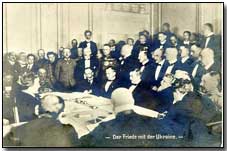Primary Documents - Ukraine's Plea for Inclusion in Brest-Litovsk Peace Negotiations, 10 January 1918
 Reproduced below is the
text of Ukrainian President Vinichenko's formal plea for inclusion in the
German-Russian peace negotiations at Brest-Litovsk, on 10 January 1918.
Reproduced below is the
text of Ukrainian President Vinichenko's formal plea for inclusion in the
German-Russian peace negotiations at Brest-Litovsk, on 10 January 1918.
With the disintegration of the Russian monarchy in February 1917 nationalist Ukrainian leaders (led by Vinichenko) moved swiftly to seek a form of independence within the Russian union, a desire granted by the Provisional Government in July 1917. With the success of the Bolshevik October Revolution of the same year however, the Ukrainians found themselves accused of essentially aiding and abetting anti-Bolshevik forces within Russia.
Ukrainian President Vinichenko consequently issued a proclamation of autonomy on 20 November 1917 in response to the unrest within Russia. He reiterated the Ukraine's desire to remain autonomous within a wider Russian union - to no avail. The following month, December 1917, brought the Ukraine into civil war against Bolshevik forces (click here to read Lenin's ultimatum on the subject).
Ultimately the Ukrainians sought protection from the Germans with whom they negotiated a peace treaty at Best-Litovsk in 1918. Exacting a heavy economic price for their support the Germans duly took the Ukrainians' side and obliged the Bolsheviks to accept an autonomous Ukraine. The Ukraine declared independence on 22 January 1918. (Click here to read the terms of the peace treaty agreed between the Ukraine and the Central Powers.)
Ukrainian President Vinichenko's Appeal to the Brest-Litovsk Peace Conference, 10 January 1918
1. The entire democracy of the Ukrainian State is striving for the termination of the war, for peace throughout the entire world, and a general peace between all the belligerent powers must be democratic and must assure to every people, even the smallest, full and unlimited national self-determination.
2. The peace which is to be concluded between all the powers must be democratic and must assure to every people, event the smallest, full and unlimited national self-determination.
3. In order to render possible the real expression of the people's will, proper guarantees must be given.
4. Any annexation that means annexation by force or the surrender of any portion of territory without the consent of its population is therefore inadmissible.
5. Any war indemnities, without regard to the form given them, are from the standpoint of the interests of the working classes also inadmissible.
6. In conformity with regulations to be drawn up at the peace congresses, material assistance must be given to small nations and States which in consequence of the war have suffered considerable losses or devastations.
7. The Ukrainian Republic, which at present occupies the Ukrainian front on its own territory and is represented in all international affairs by its Government, whose duty is the protection of the Ukrainian people's interests and which acts independently, must, like other powers, be allowed to participate in all peace negotiations, conferences, and congresses.
8. The power of the (Petrograd) Council of Commissioners does not extend to the whole of Russia, and therefore not to the Ukrainian Republic. Any eventual peace resulting from negotiations with the powers waging war against Russia can therefore be binding for the Ukraine only if the terms of this peace are accepted and signed by the Government of the Ukraine Republic.
9. In the name of all Russia only such a Government (and it must be an exclusively Federal Government) can conclude peace as would be recognized by all the republics and regions of Russia possessing a State organism. If, however, such a Government cannot he formed in the near future, then this peace can only be concluded by the united representatives of those republics and regions.
Firmly adhering to the principle of a democratic peace, the Secretariat General is also striving for the speediest possible attainment of this general peace, and attaches great weight to all attempts which can bring its realization nearer. The Secretariat therefore considers it imperative to have its representatives at the conference, while at the same time it hopes that a final solution of the peace question will be reached at an international congress.
VINICHENKO
President of the Secretariat
Source: Source Records of the Great War, Vol. VI, ed. Charles F. Horne, National Alumni 1923
"Beachy Bill" was the name given to one of the Turkish guns which regularly shelled Anzac Cove.
- Did you know?
